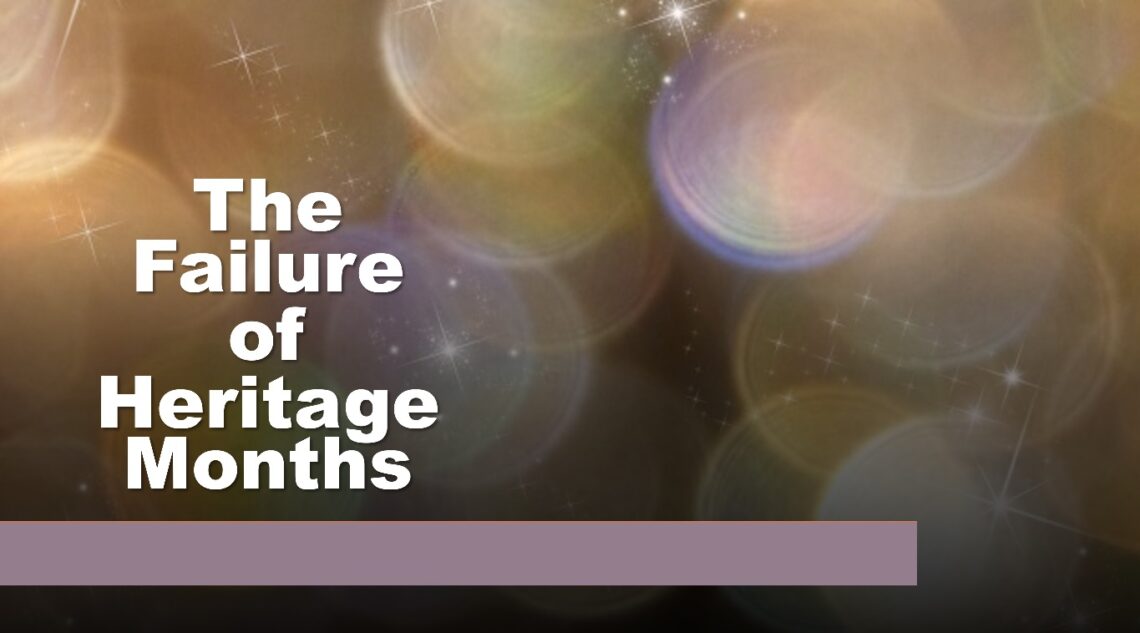
The Failure of Heritage Months
Three years ago, I posed a question for my friends… “What are your earnest feelings about history and heritage months?” My question came hours after a disconcerting interaction with a student while covering a class in September 2017:
ME: “Chicos, fun fact, Hispanic Heritage month started last Friday with –“
STUDENT: “When is European history month I wonder, maestra?”
ME: *slowly* “Every day… You took a whole year of it last year too. Western civ…. remember?”
While this pre-teen’s comment was moderately disturbing, I don’t want to focus on whose views he was regurgitating today, but rather how current history curriculum is damaging to generations of kids and how we can save it.
September 15th marks the start of Hispanic Heritage Month, one of several chunks of 30ish day periods “dedicated” to honoring and learning about influential cultural groups and their contributions to our nation and society. However, these months, even if acknowledged, are a disservice and an excuse to avoid properly integrating curriculum. A bowl of nachos at lunch or a cafeteria banner of papel picado is not an education. It is barely exposure, not to mention stereotypical.
Perhaps you think it’s up to the language departments to coordinate how heritage months are observed? Then who takes ownership of Black History Month? Asian and Pacific Islander Month? Native American Heritage Month? Women’s History Month? Did I mention Irish, Jewish, Arab, and Italian also have history months?

Starting as a week-long observance in 1926 thanks in part to historian Carter G. Woodson and other prominent African Americans, Black History Month was officially recognized by President Gerald Ford in 1976. He thought it was time for all Americans to “seize the opportunity to honor the too-often neglected accomplishments of black Americans in every area of endeavor throughout our history.”
“Every area of endeavor throughout our history.” This part of his statement stands out and highlights our current failure to integrate the accomplishments of different backgrounds into our history. We will continue to fail as long as we continue to “neglect” those whose impact should not be ignored.
Hispanic Heritage Month began five days ago, September 15th, and given the three decades of national acknowledgement, our current mode of honoring is dismal and disappointing. Enchiladas and posters of Frida Khalo in the hallways does little to remember the major contributions and suffering of a massive amount of people, many of whom have ancestry in this land longer than “America” has been in existence.
Heritage months offer an opportunity to celebrate cultures but do little to explain the substantive “why,” which leaves us open to ignorant comments such as, “When is white history month? Why do THEY get a month / When’s MY month?” and such. I answered a similar question above, but I can see how one may find these concepts confusing because “the concept of whiteness doesn’t offer much in terms of a true heritage.” My city has German festivals, Polish festivals, Lebanese festivals, a Lithuanian Market and other such local celebrations led and supported by the community.
Heritage months are not inherently bad or failures. Some feel celebrated and seen, and that is definitely a positive. To clarify, the concern here is not about an equality of heritage months, but the lack of adequate representation of the large groups of people who contributed to the development of this country that have been intentionally left out of our history books and curriculum to the point where we feel the need to create a separate ideology of celebratory time frames instead of the inclusive approach of simply acknowledging people and merits as interwoven throughout our American story.
Even with those few but loud statements, we must acknowledge heritage months as they are now, and they are designed to make us feel safe, like we’re doing a good job. Look at us being inclusive! They stoke white comfort that we are doing our part to represent and honor those “outside” of the desired social construct (or curriculum), and it’s wrong. The desire for representation and celebration is valid, but having designated months further isolates the culture instead of appreciating and understanding we would not be where we are without them. We ARE them.
I understand the “need” for heritage months because of the overall lack of representation of historically marginalized groups of people in this country in our own history books, but I have noticed the way these months are traditionally “celebrated” do nothing for the retention of knowledge and culture and almost nothing for the overall appreciation of the contributions these large groups of people gave to our own society. As previously acknowledged, a month is not enough time to teach the relevance of an entire culture over the span of this nation’s history, let alone human history. This is why an inclusive curriculum matters.
If you are in the camp of American Exceptionalism, then you may find the notion of updating curriculum triggering. First thing to know is curriculum is updated yearly in all content areas simply due to research and developments in pedagogy and overall knowledge. If your fear is that updating history curriculum pushes a political agenda, keep in mind that teaching history is already inherently political as 1) Victors write the history, and 2) Our history books have already been altered plenty to suit a political purpose by choosing to leave out or change specific narratives. Correcting and improving our books can only benefit our society, taking us out of ignorance and into realization. Isn’t that the whole promise of education?
A friend of mine noticed the “palpable difference between the approach to European history versus (fill in the blank) History Month.” There tends to be more of a celebratory approach to the History Months and rightfully so but are people encouraged to identify and celebrate with “regular” history in the same way. Personally, I see what he was saying about the tone of celebration versus the inherent study and understanding of cultures being present in these months. I know I wish to see heritage understood versus merely celebrated within a contained frame. I appreciate a good taco or pupusa as much as the next person, but if all I glean from an entire culture after decades of “celebrating” their heritage is a potential menu item, then I feel cheated. Not just as a Latinx person but with other Heritage months as well.
Multiculturalism should be what is taught, as opposed to specifically two or three groups at a time if at all. It should be done frequently and throughout the year. You want to maintain the celebratory aspects history and heritage months have provided? Consider diversity months where schools recognize all the unique cultures and ethnic groups represented in their school and community, and those which are not. Remember, your personal school’s demographic should not be the guide for how you teach this information if inclusion and accuracy is your goal.
The moral of the story here is a few cliché shout-outs does not comprehension nor education make.
We know better, so let us be better.
You May Also Like

Monday Musing – Spice of Life
July 2, 2018
Top 3 Thursday – “Defenders”
June 15, 2017


One Comment
cabinet-pgumos.ru
September 15 to October 15 is celebrated nationwide as National Hispanic Heritage Month. It traditionally honors the cultures and contributions of both Hispanic and Latino Americans as we celebrate heritage rooted in all Latin American countries. During this month and throughout the year, we, and our partners, share history, heritage, and accomplishments of Hispanic and Latino Americans of past and present.